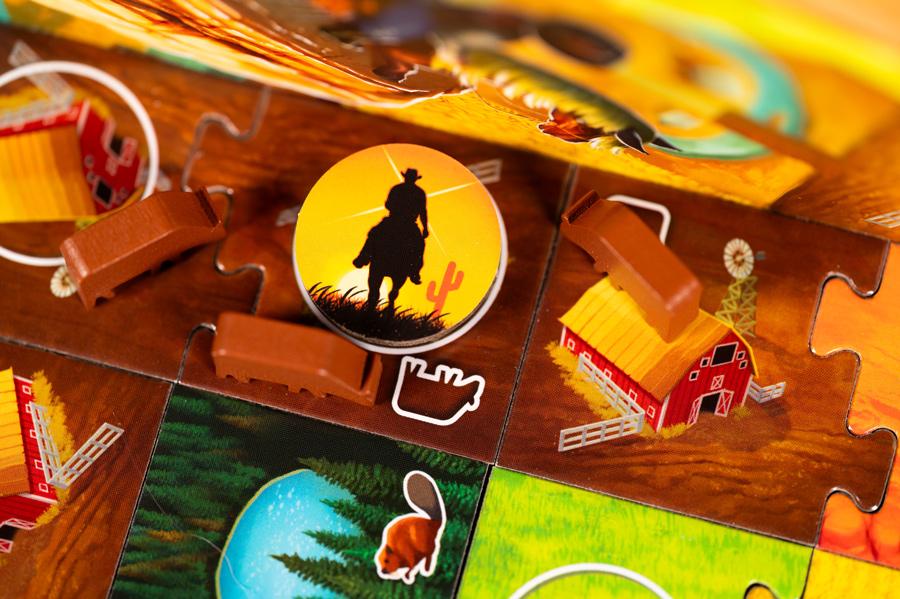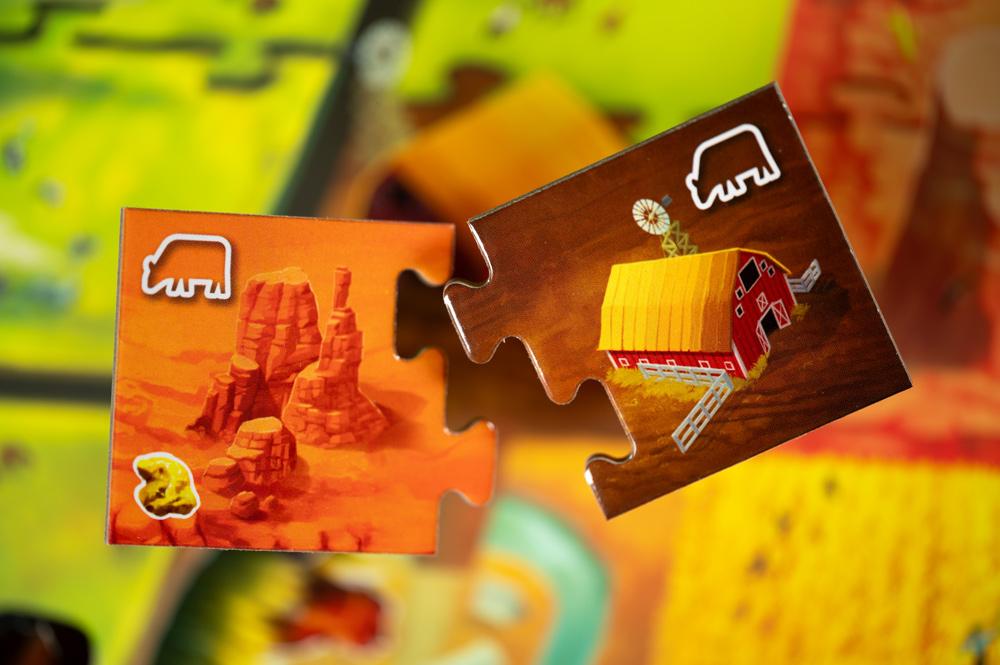Build Your Own Dominos in Moon River, A Kingdomino Sequel

Build your ranch, herd your cattle, and maybe even rustle some from your neighbors, in the newest game from the series that began in 2016 with Kingdomino.
Published by Blue Orange Games, Moon River is a tile drafting and placement game designed for 2-4 players, and played in 45 minutes.

Photo provided by the publisher
Gameplay
Each player takes a ranch board. These ranch boards have three reservation slots and also three bridges along their top edge.
Four puzzle pieces are drawn from the box, with each piece having a number on the back. They’re arranged from top to bottom in numerical order and then flipped face-up. Each puzzle piece makes up half of a domino and shows a plot of land. Land plots come in six different varieties. Plots can also feature gold, beavers, or corn.
Each round, there will be four plots in the display from the previous round, as well as four new puzzle pieces forming a new row next to it. Each player will have a meeple on one of the pieces in the first row. Going from the top of the display to the bottom, players take turns based on the order of their meeple. On a player’s turn, he takes his meeple as well as the puzzle piece it was on. If he has an available reservation slot, he can place the puzzle piece on that. Next, the player may expand his ranch. He must always do this if he has four puzzle pieces.
When expanding the ranch, a player takes two puzzle pieces and puts them together to form a domino. He then places the domino into his ranch. He can choose to place two dominos if he has four puzzle pieces. The ranch must fit inside a five-by-five grid, and at least one of the two plots on the domino must be placed either next to one of the bridges on his ranch board, or next to a plot of the same type. Matching plots that are grouped together are called a territory. If a player must place a domino but does not have a legal way to place one, it must instead be discarded.
Next, any symbols on the newly played plots are resolved. A cow meeple is placed for each cow symbol. If there is a skull symbol, a cow must be discarded from the territory it is played into, if possible. The skull only activates when initially played. Finally, a circle allows the active player to choose a partner token from the partner display and place it on the circle, either face-up triggering that partner’s ability, or face-down as a cowboy. A cowboy protects cows from being stolen from his territory and also allows the player to move cows around his ranch. A cowboy gives three movement points, which can be spread out as the player desires between his cows. Partner abilities include stealing a cow from an opponent’s board or swapping a puzzle piece in the active player’s reservation area with one in an opponent's. There are also additional partners that score points at the end of the game based on the number of gold, beavers, or corn in a ranch.
Finally, the active player ends his turn by placing his meeple on any unclaimed puzzle piece in the second row of puzzle pieces. At the end of the round, after each player has taken a turn, a new row of puzzle pieces is drawn.
The game ends once players have gone through all the puzzle pieces. Everyone can expand their ranch with any remaining puzzle pieces in their reserves. At this point in the game, a plot of land can only have one cow on it, so players discard any excess cows. Then points are totaled.
Each territory is worth the number of plots that make it up, multiplied by the number of cows in that territory. So, territories with no cows are worth zero points. Each gold, beaver, and corn symbol in a ranch is worth one point, and certain partners also earn points based on gold, beavers, or corn. The player with the most points wins.

Photo provided by the publisher
Review
Moon River has an interesting concept at its heart: build your own dominos. It gives players more choices and more control over the tableau they’re building, as does the fact that they can manipulate the position of the cattle to affect which of their territories end up scoring the most points. This can make puzzle pieces with cowboys as important to draft as pieces that offer cattle.
The mechanics also work quite well with the game’s theme. Cows are being driven between territories, players are rustling cattle off of one another, and ranches are being built up. The mechanics and theme combine into a happy whole.
All of that being said, it does lack some of the elegance of Kingdomino. There was a beauty in the simplicity of that game that its successors have all lost to different degrees with additional complications and rules. Here, it slows down play time and makes it a more difficult game to teach. There is even an additional, advanced variant included in the rulebook to add even more elements to gameplay. That added complexity, however, might make this a better fit for some groups looking for a weightier game.
The component design is well done. The puzzle pieces fit together easily, but not so snuggly that there is quickly going to be wear and tear on the connection points. Generally, the game is also just bright, colorful, and attractive like the other games in this series.
There is something inherently satisfying about jigsaw puzzles and snapping pieces together, and that tactile element is a fun addition to Moon River. The domino-building is a clever idea, and the result is a good, solid game with a lot of strategy, light take-that elements, and a lot of thinking to be done with each choice. If you like the core gameplay of Kingdomino but are looking for something with a bit more weight, we did enjoy this more than its sister game Queendomino, as the design feels more tidy, and the ability to move the cattle really adds something to the strategizing.
Pros: Puzzle piece components are well designed, theme and mechanics work very well together, ability to manipulate cow placement adds nicely to the strategy
Cons: Loses some of the elegance of Kingdomino, takes longer to play
Disclosure: we received a complimentary review copy of this game.







